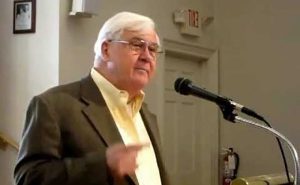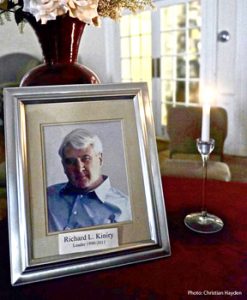“Remembering Richard” by Hugh Taft-Morales

It will take the Ethical Society a long time to process the fact that our Leader Emeritus, Richard Kiniry, is no longer amongst us. The private side of him kept the details of health decline somewhat hidden from view. This column just scratches the surface of what he meant to us; a hundred such columns would not do justice to the man and his work. At least we will have an opportunity to honor him more formally at a memorial service later this spring, details to follow.
Personally, I am indebted to Richard for his support as one of my mentors. He offered candid advice when asked, appropriately shared useful wisdom, and gave me the space to become PES’s Leader in my own way. In particular I valued his intellectual work, and invite exploration of Richard’s writings on our website. He was known amongst the National Leaders Council (our national humanist clergy group) for fluid writing, philosophically sound reasoning, and ethical insight.
He was a Renaissance man – he had many talents and areas of expertise, from his teaching skill demonstrated in many of his continuing education classes to the gourmet meals he prepared at his home when entertaining. Betsy fondly remembers summer evenings in Richard’s garden – a “quiet spot of nature in the midst of South street, amongst rocks, plants of all kinds, a fish pond home to sinuous carp, birds in the trees” – when he would prepare and serve delicious salmon, vichyssoise, and assorted canapes.
His artistic side was on display every day in the Leader’s office, the trees and light of Rittenhouse Square reflecting off a beautiful mirror he crafted. For our Winter Solstice services he would deck the hall with garlands of pine, famously teetering on a ladder to do so, leaving the auditorium lovingly prepared and ready for us to “bring back the light.” A small touch of thoughtful artistry was related by Aissia, remembering how her grandmother, Bertha Waters, worked with Richard to enhance our Sunday flowers on the podium with a metal container. The brass vase will remind us of their partnership as “problem identifiers and problem solvers.” As Aissia put it, “They shake the tree so others can pick up the fruit.”
No reflection about Richard would be complete without mentioning his own embrace of the “cranky curmudgeon” label. Perhaps he was different earlier in life, but in the 15 years I have known him, Richard liked to play this role – making wise cracks, complaining about the cruelties and superficialities of the world. As Betsy recalled, Richard was “a man of strong opinions that he did not hesitate to express,” and he often did so with a flair. John Marshall recalls Richard’s “dry humor” and the time he threw chalk at someone for agreeing with him about the challenge of correctly pronouncing his last name!
Little will stick with me as much, however, as Richard’s earnest and sincere dedication to explaining and advocating for Ethical Humanism. When searching for a spiritual home, Nick remembers being warmly welcomed by Richard who “gave me the conceptual underpinning of a life as an ethical humanist.” Nick explained that “[t]he readings and discussions he provided led me to see that naturalism and ethical human relationships were quite adequate and fulfilling. I have since then been building on that foundation.”
Lelah, who only knew Richard for a couple of years, appreciated the fact that “he seemed to be a die-hard old school left wing liberal.” He certainly rejected the “dog-eat-dog” competitive capitalism promoted by those wanting to sanctify greed. His politics revealed his deep sympathy for the downtrodden. Despite his cynicism, Richard had faith that human beings could make the world a better place. He believed that government and other forms of collective action should be directed to feed the poor and protect the planet. He admirably represented our proactive approach to the world encapsulated by Aissia’s words: “Ethical culture teaches not to accept the status quo and to not just complain but actively work to make positive change.” Thank you, Richard, for being such a good teacher.



